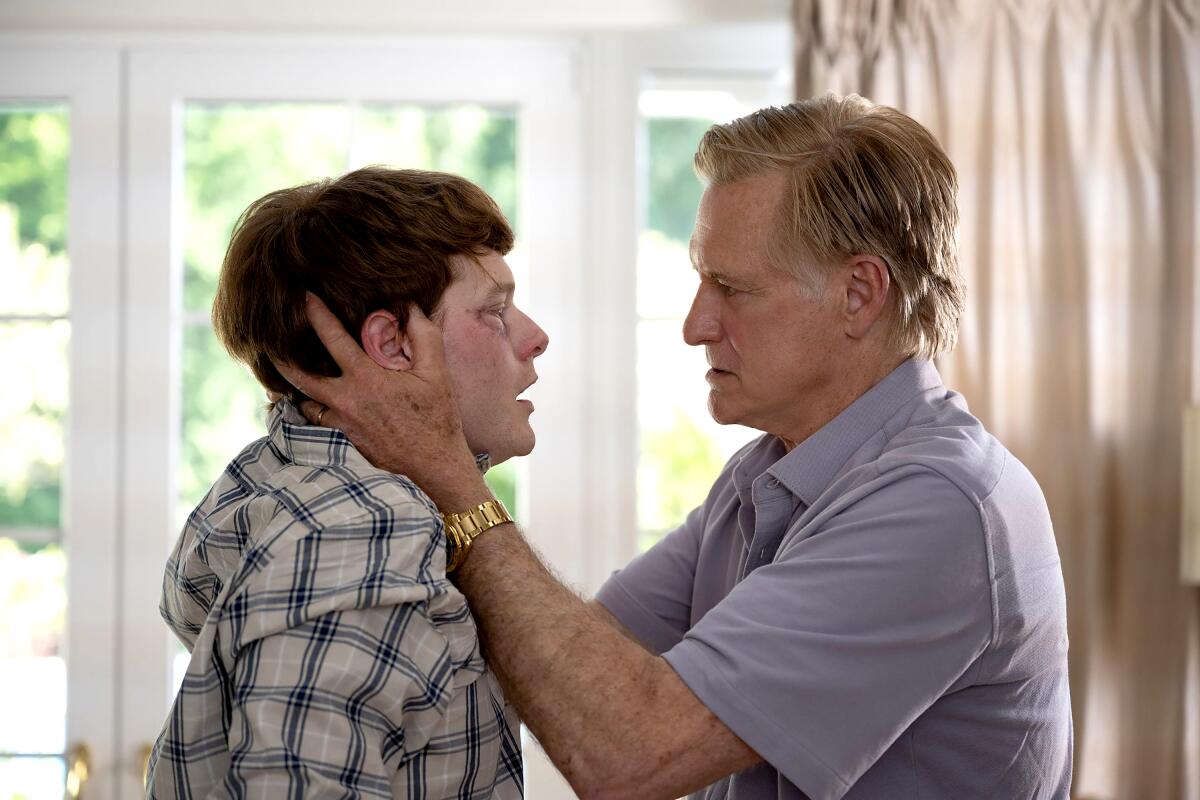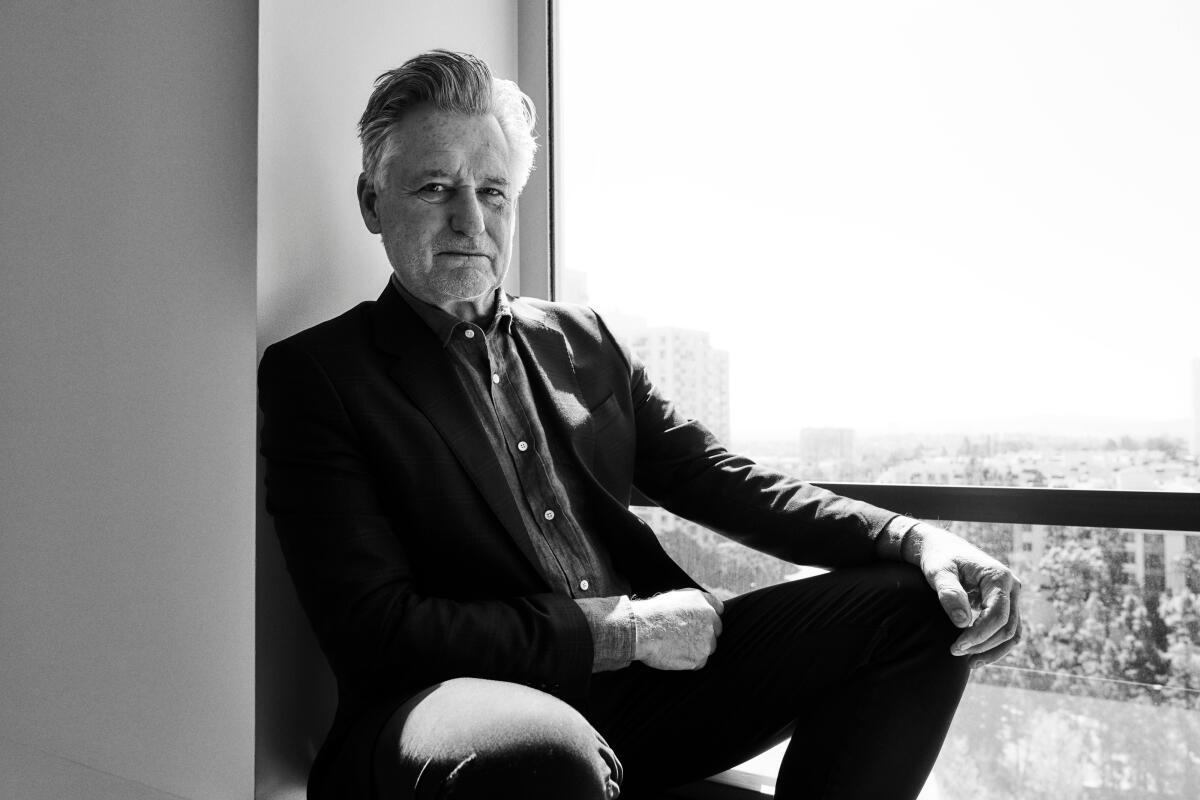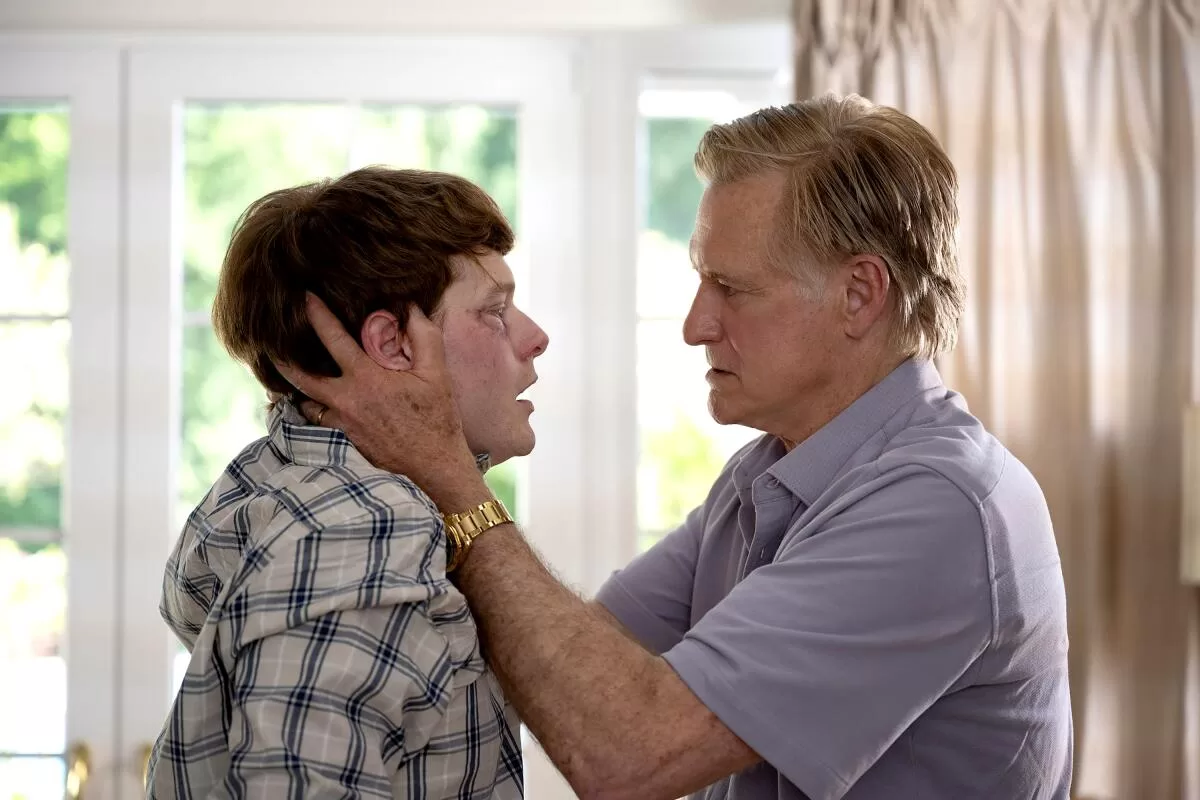“I kept thinking maybe it’s because they anticipated I’d look all right with ginger hair,” jokes the warm and genial Pullman during an early spring interview in Los Angeles.
But a switch in hair color was just a small part of the actor’s deft transformation to evoke Alex Murdaugh, the South Carolina lawyer — and scion of a prominent legal family — who’s currently serving two consecutive life sentences in state prison for the 2021 double homicide. (He was also sentenced to 40 years for financial fraud.)

(Lifetime)
Not that Pullman’s dye job didn’t initially worry the veteran actor. “The movie’s makeup and hair heads took me to a [suburban Vancouver] strip mall where there was this beauty salon and I just thought, ‘Oh, my God, how did this happen?’” he says with a wry smile. “But they did an excellent job.”
Though he’s perhaps best known for warm-hearted or heroic roles in such movies as “Sleepless in Seattle,” “While You Were Sleeping” and “Independence Day,” a check of his 100 or so screen credits reminds that his career has been peppered with much darker parts. These include serial killers in both the BBC One/Starz series “Torchwood: Miracle Day” and Jennifer Lynch’s 2008 film “Surveillance,” as well as a detective with a troubling underside in USA Network’s anthology series “The Sinner.”
“It was the same when I did ‘Lost Highway,’” recalls Pullman of 1997’s surreal thriller, in which he played a murder suspect. “When they asked [director/co-writer] David Lynch, ‘Why did you cast Bill?’ he said, ‘His eyes. He looks like a guy who could get himself in a lot of trouble.’” (Pullman slyly admits that he’s had a few “harrowing moments” in real life.)
Still, Pullman initially had misgivings about playing Murdaugh in the breakneck production racing against the looming actors’ strike last year. “I think I had probably eight days to prepare,” says Pullman, “and the first two were taken up with me saying, ‘I don’t want to do this,’ because I just had not followed [the Murdaugh story], I had no information. All I knew is that he killed his wife and son.”
But that changed once he finally read Michael Vickerman’s teleplay, which blends transcriptions of actual courtroom testimony, dashcam footage and Murdaugh’s 911 call. “I was intrigued by the text of the script,” Pullman says. “I could feel there was something really unusual going on in the thought process when you actually write things down the way they’ve been spoken. A lot gets revealed in that.”
Discussing the character with the film’s director, Greg Beeman, helped too. “I said, ‘I have the feeling that the bedrock of all this is that Alex loved his wife and loved his son.’ Greg said that was his feeling too. So I thought, ‘OK, that’s a premise we can start from, that’s going to be valuable. It’s a paradox.’”
The actor calls having all those Murdaugh tapes to study “a blessing and a curse” and found that he had to pull himself out of “the weeds” to start inhabiting the role. That’s when, right before shooting began, another key insight struck: He had yet to put himself into the role.

Bill Pullman has played troubled men in more roles than you might expect.
(Shayan Asgharnia / For The Times)
“You realize, everyone’s been looking at this [coverage of the Murdaugh case] and they’re going to want a mirror,” Pullman says. “I told Greg that, just to give myself some slack and some elbow room, I wasn’t going to do an impersonation — meaning I wasn’t going to stand around and say, ‘Oh, [Murdaugh] didn’t turn left when he said that, he turned right.’ And Greg agreed.”
Though the actor was inspired by the abundant footage of Murdaugh, he also didn’t try to duplicate the disgraced attorney’s Southern inflection. “I don’t think of him as having that specific accent,” Pullman explains. “Nowadays there are more urbane people living in the Piedmont. Nobody’s coming out of the hills doing any of those big, back-throated things.” He adds, “But how amazing it was to have that much material to base something on. I just had never had anything like that before.”
And how did Pullman channel the heinousness of his character, who was a habitual liar, drug abuser, embezzler and, ultimately, killer? “Well, I think he’s a guy who says, ‘I can handle everything,’ so that’s the perfect candidate to build up a big thundercloud when he doesn’t know it’s going to rain — and it rains,” the actor says. “Like suicide, it has some psychiatric patterns. You read a bit about brain chemistry and you realize on those arcs of mania and depression, which Murdoch was chasing while using [oxycodone] pills to keep up above the darkness … that people can present as competent — until they’re not.”
Pullman concludes, “That’s all interesting stuff. You don’t get to do that playing a good guy. But it does make you want to do a comedy next.”
